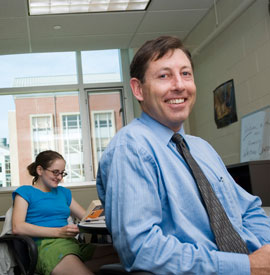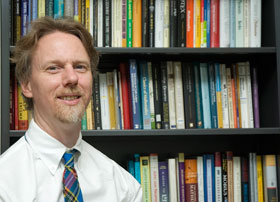  |
| HOME | THIS ISSUE | CALENDAR | GRANTS | BACK ISSUES | < BACK | NEXT > |
New directors to expand scope of writing, numeric skills centersby Elizabeth Omara-Otunnu - September 19, 2005 |
||||||
|
Two centers established last year to support the teaching and learning of writing and quantitative skills at the University have new permanent directors. Their appointments coincide with the launch of the new general education system, which requires that students demonstrate competency in writing and quantitative skills.
Thomas Deans will head the University Writing Center, and Tom Roby is director of the Q Center. Deans holds a Ph.D. from the University of Massachusetts at Amherst and previously taught at Haverford College, where he was director of college writing, and Kansas State University, where he was associate director of the expository writing program. Roby, who holds a Ph.D. from MIT, joins UConn from California State University, where he ran a large professional development program in math for K-12 teachers. Each holds a faculty appointment as associate professor – Deans in the English department, Roby in math – and each will teach one course per semester. The two centers offer tutoring services, staffed by graduate students and undergraduates, on a University-wide basis. But their mandate is broader: They will also offer support to faculty teaching or developing writing or quantitative skills. In recognition of this, they were recently brought under the umbrella of the Institute for Teaching and Learning. In addition to workshops for faculty and teaching assistants, the centers will hold an open house on Wednesday, Sept. 21, on the first floor of the CUE Building, beginning at 3 p.m. Deans and Roby urge faculty to attend the event, not only to find out about the services currently offered by the centers but also to let the directors know what is needed. “The two centers are still in formation,” says Deans. “If faculty tell us what they need, they can play a role in shaping them. These centers will be what faculty make them.”
A shared responsibility Deans says teaching students to write effectively is a shared responsibility, and this is recognized in the new system. “Writing means argument, analysis, and learning a new structure. Like critical thinking, it can’t be taught in one course,” he says. “The only way to get strong writing is if everybody is teaching it, holding students accountable, and treating it as a developmental process.” He says college places “new intellectual demands on students, and writing is one of them. The five-paragraph essay that worked well in high school may get a poor grade here. When students have to try to think like a philosopher in a philosophy class, for example, part of that is learning to write like one.” He says concerns about writing are not new, but the way writing happens and the kinds of writing students do have changed. “The web has created more opportunities for writing,” he says, “although most of it doesn’t fit with the academic framework.” Deans stresses that the Writing Center is not just for “problem” students. “The center is part of the constellation of support for all UConn students,” he says, and they can benefit from its services at any stage in the writing process. The Writing Center network includes tutoring locations in Babbidge Library, the College of Agriculture and Natural Resources, the School of Family Studies, and the College of Liberal Arts and Sciences, as well as writing coordinators at each of the regional campuses. It also plays a consulting role to other units, such as the School of Business.
Charting new ground “One of the major charges of the Q Center is to find out what is needed to support quantitative learning,” says Veronica Makowsky, vice provost for undergraduate education and regional campus administration. “People have been complaining about students’ writing for years. Now as a society, we are questioning whether we are producing enough math and science people, and what is the best preparation in quantitative disciplines.” In addition, she says, as the average SAT scores of students entering UConn improve, more of them are coming to the University with an interest in math and science. In order to go into those fields, they have to pass gateway Q courses. The Q Center currently focuses on tutoring students taking Q courses in math, physics, and statistics, although students looking for help with other quantitative courses will not be turned away. It is also involved in developing online resources for students and faculty, and seeks to be a clearinghouse for information, pointing students to other resources that can help them. Roby says there has been a lot of research on writing, but research on quantitative skills is “behind that curve. At the K-12 level, we understand better how to teach kids how to read and write than how to teach them to do math.
“A lot of students have been taught math very poorly,” says Roby. “We don’t have strong baselines to work with. And they come with a fear of the subject – ‘math anxiety’ – that holds them back even if they are capable of doing the work.” This poses an extra challenge for math tutors, he says. “Tutoring is not just about how much math you know, but about your ability to communicate with students who are struggling with it, possibly not in the ways you struggled with it,” Roby says. “A good tutor is a combination of technical and interpersonal skills. You need both to be effective.” Websites: Q Center | Writing Center |
| ADVANCE HOME UCONN HOME |


